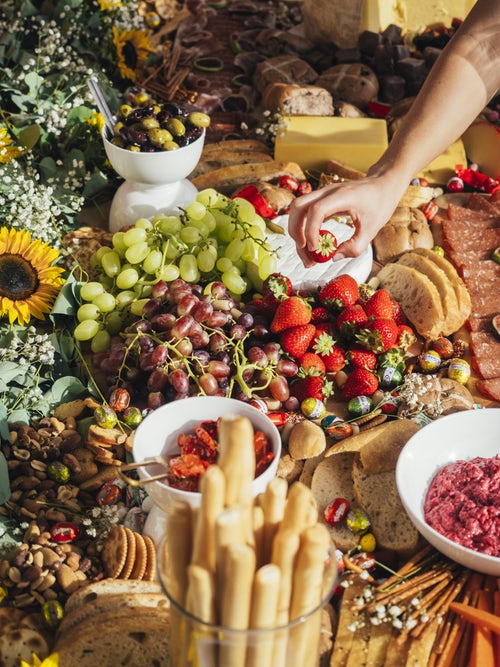So how did you do with your conscientious eating on Thanksgiving, Black Friday outings and throughout the weekend?
Did you manage to alter some of the expected family gathering eating habits a bit, or fall a little short of your hoped-for goal?
A (little) different Thanksgiving—
Here at the Owan household, we had a mixed bag. I didn’t tell anyone in the family about the changes or transitions I planned to make, or expect them to go along with me. I just got up in the morning, strapped on my post-surgery shoe, and set about fixing a brunch spread for Chris and my younger son, Cory, to enjoy before the main three o’clock feast.
By the time Cory rolled out of bed (around 11:00ish), the kitchen counter was spread with baked brie, grapes, crackers, soppresatta, (in honor of Cory, who fell in love with the Italian sausage while studying abroad), turkey summer sausage (in honor of Chris, who grew up on the fattier variety in Wisconsin), Basque cheese (in honor of our recent pilgrimage through that gorgeous country), blueberries, raspberries, navel orange slices, and several other minor selections. Oh, and Café con Leche and spiced apple cider, of course!
It was a hit! Not all items would have made the top 10 (or 20) health foods list, but it was a nice assortment that filled us up sufficiently to avoid gorging at the big meal. In fact, we enjoyed it so much, that Chris and I decided we’d opt for that kind of Thanksgiving meal every year from now on, were it not for the other family members expecting the regular turkey and sides.
The main meal fare—
At dinner I started off with a plate-filling salad of mixed greens, (no Romaine, of course), fresh pineapple, heirloom tomatoes and mandarin orange slices with just a swish of olive oil and Thai ginger salt. By the time I got to the “main course,” I was full enough to opt for just a couple of small turkey pieces, and a little stuffing, mashed potatoes and gravy, (the tastiest Chris has ever made, I might add), and two of those ubiquitous crescent rolls (items for my mother and Cory, who can’t seem to celebrate Thanksgiving without them).
Then I actually finished the meal with a bowl of butternut squash soup.
And much later, after cleaning the kitchen, I did sit down with a slice of relatively healthy pumpkin pie, although it is beyond me why American dessert makers feel a need to overpower the wonderful natural flavors of the ingredients with an overload of sugar.
The following day Chris and I sent Cory back to grad school with a grocery bag full of leftovers—ham (one of his favorites), mashed potatoes, turkey, and stuffing. And the remainder of the corn bread (I’m allergic to corn), and the three leftover crescent rolls. (I love those things, but the dough conditioner and other assorted preservatives and flavorings in them never fail to make me feel bloated and sick!)
Chris had one more piece of pecan pie and then, without prompting, tossed the rest of it in the garbage. We did kill the pumpkin pie, ourselves, though.
Looking ahead—
Don’t fret if you feel as though you failed at your first conscientious eating attempt.
The holidays are a tough time to initiate a new eating paradigm, not just because there’s an avalanche of health-compromising food available. It’s also because your loved ones, friends and co-workers are often your biggest saboteurs in your efforts. If they feel the least bit convicted, they’re likely to go to supreme efforts to squash your intentions. The status quo social pressure can be your undoing.
As you go forward to Christmas and New Year’s celebrations, keep the following tips in mind—
First step: Pray, pray and pray some more! For resolution, direction, protection and determination. Don’t plan to fail. Plan to persevere and succeed!
As you move forward toward Christmas, have a plan in place and work the plan. Don’t attend events where you feel you’ll have tremendous difficulty making healthy choices, of any kind. It’s better to stay away than lead yourself into temptation.
Decide ahead of time what you’re going to eat, and what you will stay away from.
Give yourself permission to indulge a few fattier or sugar-laden treats, but make sure you have a number of items or number of bites already programmed into your brain before you head to the buffet or dessert table.
Remember, you can only control the things you can control! Don’t try to control others or even make comments about their lousy meal choices. Be uplifted and internally happy about the choices you’re making and the success you have.
Again, remember to tend to yourself first. If you’re not in prime condition, how much energy and time can you devote to someone else and their needs? How effective will you really be at it?
Keep a running mental check on how you feel. Are you feeling sluggish? It may be that you haven’t had enough water to drink, so reach for 8 ounces of water and drink that before opting for another cup of coffee or an artery-clogging Red Bull!
If you’re going out to eat, access the restaurant’s menu on line and decide what you’re going to order ahead of time. Ask a loved one or trusted confidant to steer you clear of the desserts. Two truly are better than one in this game.
For every meal you successfully manage to avoid health-diminishing food and choose something health benefiting, give yourself a non-food treat—a certain amount of time to spend uninterrupted in the spa, reading a good book, adding the money you would have spent on the food to a personal “Reward” piggybank.
If you are experiencing flu-like symptoms, (I bring it up here because we’re into flu season and food and social exposure does play a part), STAY HOME FROM WORK! And avoid sugar like the plague. Processed sugar actually stifles the immune system so it can’t do its job. More scientists and doctors are recognizing sugar’s role in a plethora of diseases.
Make sure you get 7 – 9 hours of sleep a night. Being tired suppresses the immune system and also makes it difficult to make sharp decisions, like choosing good foods.
Whenever possible, cut out oils made from seed or vegetables. They cause damaging inflammation.
Don’t try to keep up with everyone else! You’ll feel stressed, and your brain won’t function properly. When you’re under stress, you crave sugar, fat and salt, and there is no satiation point for these ingredients. Your body will want and demand more and more and more.
AVOID ANY food that contains high fructose corn syrup. It functions like crack cocaine to your body and brain—highly addictive and damaging.
Be aware of your emotions. Emotions cause people to reach for the wrong kind of food. And once the decision is made in the brain, it’s nearly impossible to reverse it.
If you want some relaxation, reach for a piece of cheese. Cheese contains opioid-like compounds.
For lunch and breaks, go outside to enjoy the fresh air, and stay off your phone and computer!
If you feel compelled to eat crummy food, stop and ask yourself why. Do you really just need an outside-in-the-fresh-air break; some prayer time to connect with the Lord, who can direct you to a better way? What is it you’re hoping to accomplish by eating the food? And will it satisfy you the way you hope to be satisfied? Probably not.
Stay away from white foods—white bread, cakes, rolls, etc.
Plan some intermittent fasting days, to give your digestive system a rest and divert digestive energy into healing. (We’ll talk a lot more about that in 2019.)
It’s okay to allow yourself some weekend treats. Just make sure you keep them to a minimum.
When selecting foods look for:
natural (no GMOs, artificial coloring and minimal processing)
organic
grass-fed
antibiotic-free
hormone-free
unsalted
non-GMO
Aim for eating 8-10 servings of plants daily. That amount will outway the risk from the chemical farming poisons in them.
Aim to keep your body and brain happy and your immune system strong.
Guarantee that you will stay healthy and well through the stressful, overfull holiday season emotionally, physically and spiritually, and sail into 2019 with a bright outlook for the new year!
NEXT WEEK we’ll look at some exercise basics and helps to see you safely and happily through the holidays. And join me this Friday when I provide you with a great Functional Depression info-graphic, care of my friends at BetterHelp.
Until then, enjoy your holidays even more with good food choices and transitioning your new food plan into place before the New Year!
Blessings,
Andrea
May you prosper in all things and be in health, just as your soul prospers (3 John 2).
Photo by Marcus Wallis on unsplash

 Andrea Arthur Owan is an award-winning freelance writer, speaker, and teacher. Her nonfiction and fiction work has appeared in books, secular and religious magazines and newspapers, theater productions, devotionals, and teaching manuals. She is also a certified fitness pro and licensed, ordained chaplain.
Andrea Arthur Owan is an award-winning freelance writer, speaker, and teacher. Her nonfiction and fiction work has appeared in books, secular and religious magazines and newspapers, theater productions, devotionals, and teaching manuals. She is also a certified fitness pro and licensed, ordained chaplain.



